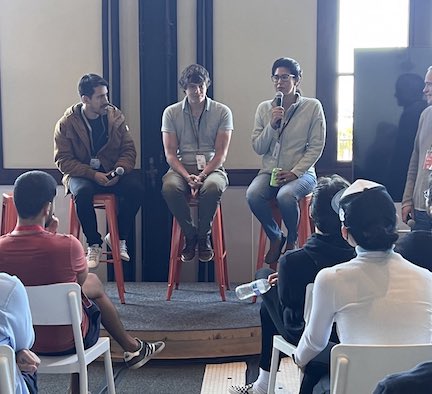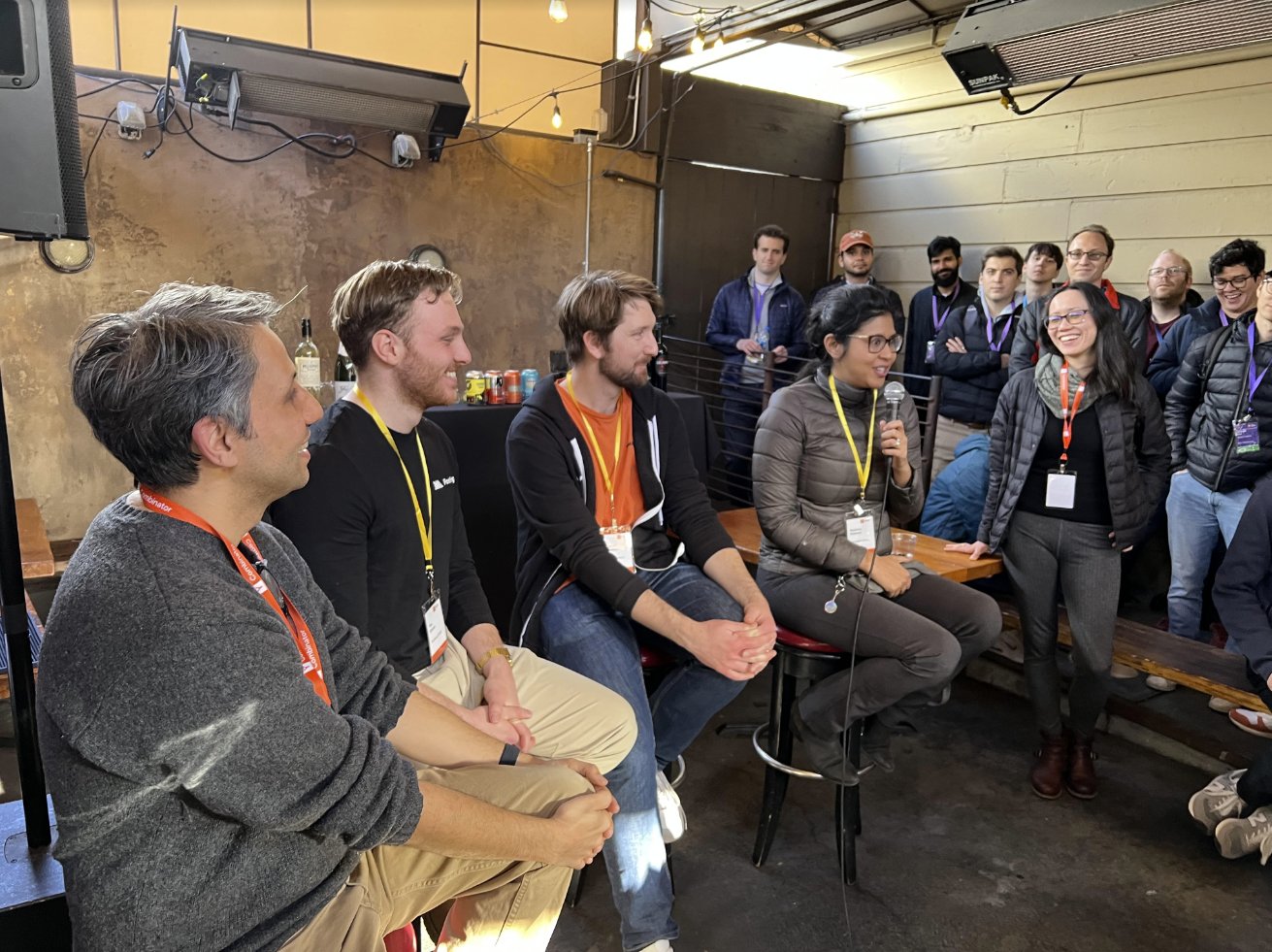YC Open Source Founders - Q&A
YC invites alumni (like us - Medplum is YC S22) to come speak for the current batch and share our experiences. We were excited when our YC Partners Diana and Nicolas invited Medplum to come and speak to Open Source and devtools companies two weeks ago.

Jorge, Michel, and me at YC (Nicolas at the edge)
However, I had a moment of panic when I realized that the other panelists were Michel from Airbyte, and Jorge from MindsDB. For context, MindsDB and Airbyte have huge communities. They are frequently featured on Hacker News - which is the New York Times of open source.
Standing side-by-side with these founders, I worried, could not be a flattering comparison.
| Repo | Github Stars | Stage ready? |
|---|---|---|
| mindsdb | 17,600 ⭐ | 😎 |
| airbyte | 11,500 ⭐ | 😎 |
| medplum | 789 ⭐ | 😬 |
A False Comparison
Here's one thing that we believe: 10 or 20 years from now, we will find the fact that we grouped open source startups together funny and peculiar. It's like looking at startups from the late 90's when "Internet" was a startup category - how quaint!
Looking back at our 2023 selves, we will have that same thought about "open source" startups - a grouping representative of the time, and not the startup itself.
YC Founders were quick to pick up the fact that we are not all the same. Below are the questions they asked in session. These answers are from the Medplum perspective, these certainly don't apply globally and the answers you get from Michel and Jorge would no doubt be pretty different.
What Founders Asked
Why did you choose open source?
Healthcare app developers have what we call "the terrible choice", (a) buy an off the shelf health records system and fight with it or (b) invest a ton of time and resources into your medical record system to build your workflow, compliance, certification and integrations.
Minimal/simple medical app implementations are rare, and when they exist - spiral in complexity when the app makes contact with the healthcare establishment (insurance billing, medications ordering, lab integrations etc).
What healthcare devs really need is a composable solution, that enables adding on functionality as needed with great abstractions. Composability is a superpower and is the key attribute of open source.
Open source has some great secondary benefits too. Healthcare devs are very jaded after repeatedly being marketed products that don't really work and/or are largely undocumented black boxes. The ability to test and audit open source in depth has appeal, and helps to build trust.
We actually "learned the open source lesson" a long time ago. The Medplum founding team founded a medical imaging SaaS startup called MedXT (YC W13). MedXT customers were constantly asking for "source code in escrow" or "source access" whenever they would sign a SaaS agreement. We should have put some careful thought as to why they were asking for it. With 20/20 hindsight, we now know that continuity of business and compliance are critical for customers, and open source is a great tool in that regard.
What were some of the most effective tactics for growing your dev mindshare early on?
We have a fundamentally different approach to growing dev mindshare than many other open source startups. We don't do launch week, memes, or advanced Tweeting. (Maybe we should, but that's not top of mind today.)
For us, getting customers to build and run in production was the first step in getting dev mindshare. Electronic Health Records have no "hobbyist" use case, if you are going to use it, it better work in production.
In that way, getting to production really early, before we had 20 stars on our repo, on was our way to establish mindshare. That production usage is something that our customers value, and that in combination with an open source, certified, well documented, compliant offering is novel for the healthcare dev.
Second to running in production, certifications are our second most effective technique to gain developer mindshare. Medplum has common certifications, like SOC 2 and HIPAA as well as some very industry specific ones like ONC and CLIA/CAP. In general devs find certification tasks tedious and un-fun, so a reference implementation appeals.
Citus Data (YC S11) and Posthog (YC W20) have a similar "in production" ethos to Medplum,

Umur (VGP YC, Citus Data S11), Tim (Posthog), James (Posthog), me holding the mic
What are your important metrics?
We track the number of projects and apps created, as well as the number that reach certain maturity milestones in their implementation on our hosted service. These are nothing fancy or sophisticated.
We work hard on our customer success and implementations. We track questions and support requests across all channels Github, Discord, Slack and email. We track how many had documentation/content already published, how many were actual bugs and turnaround times. Troubleshooting, helping others build is our customer obsession, and if their implementation is successful, we'll be successful too.
How did you get your first paid customer?
Our first paid customer used our hosted offering.
Medplum is somewhat unique in that we started with our hosted multi-tenant offering. This is the opposite of many open source companies, who start with a self-hosted single tenant offering.
Our initial customers liked what they saw in the repo, and liked that they could self-host, but decided they would rather have a managed solution. We believe that having a managed solution day 1 was crucial for us, as the time to value and feedback loop are much faster.
Do you do professional services? If so, how much?
We do a small amount of professional services in the form of workshops and pilots for prospective enterprise customers. Engineering leaders often have budget for professional services, and this type of engagement helps devs align stakeholders internally as they make the case to their leadership that they should use Medplum.
How did you decide on your license?
We support customers through many complex compliance audits and certification processes. Our license, Apache 2.0 is a reflection of that, it's well understood to stakeholders. There are code scanners everywhere in an audit.
How was fundraising as an open source company?
I mentioned in the beginning how nerve wracking it is to be compared to the Github star machines like MindsDB and Airbyte. We had to do extra preparation and communicate crisply to investors to tell our story, not a version of someone else's.
For Medplum, open source is our way to build trust. I'll compare and contrast that with some other approaches where open source is a form of marketing, and is primarily for growth.
When it comes to fundraising, the narrative is critical: we are open source to build trust with customers and prospective customers. And companies have trusted us with their data, and use us as their primary health datastore in production. The value customers get from having a trusted partner to manage their data is the basis of our business.
Break a leg on your demo day YC S23!
